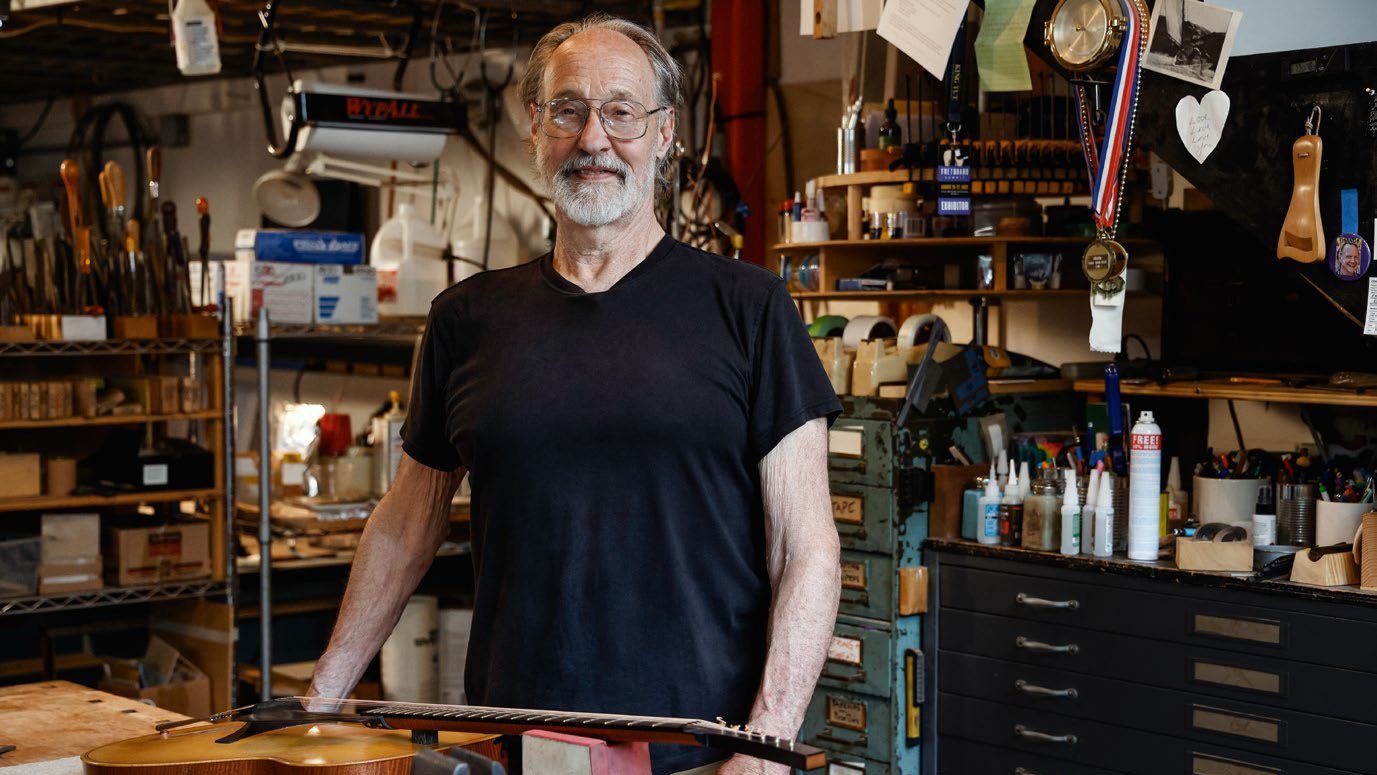“Jimmy Page once said to me, ‘Have Gibson not been onto you?’ And I said, ‘No, maybe I play too many Strats.’ I think it’s more likely they don’t know who I am”: John Squire opens up on his return to music with Liam Gallagher – and why he’s no guitar hero
The reclusive guitar great invites us to his studio to talk classic riffs, career-ending injuries, what caused the Stone Roses reunion to fizzle out, and why music keeps pulling him back in
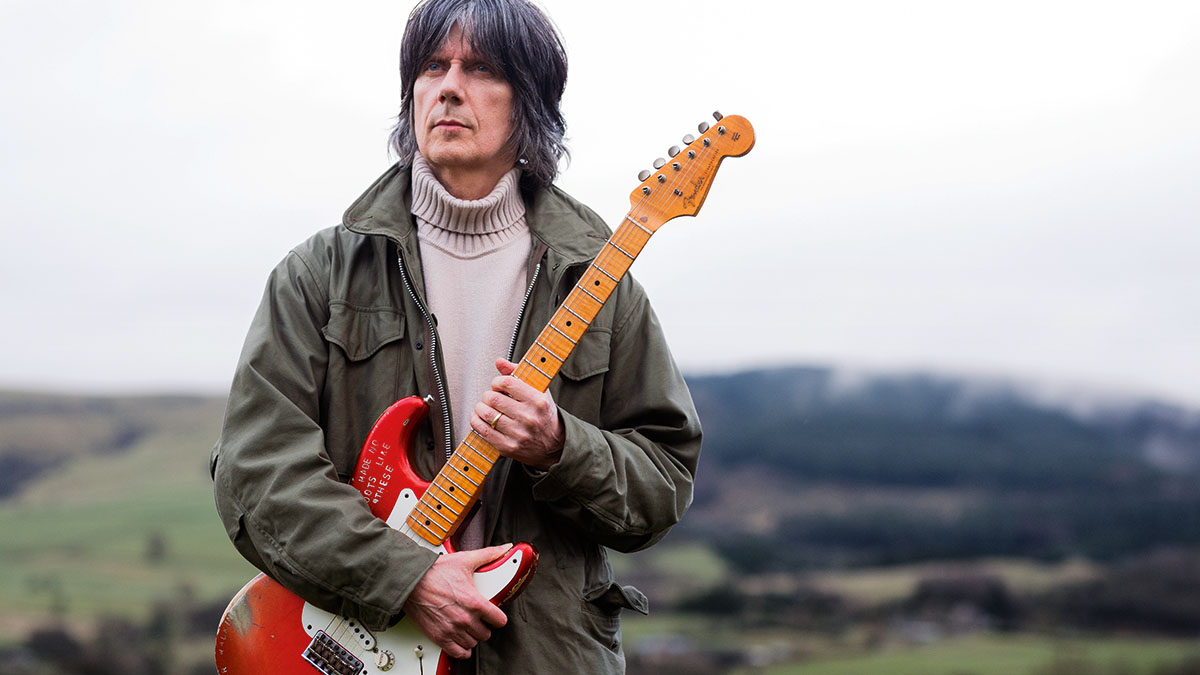
This must be the place. Deep in the sheep-sprinkled Cheshire moorlands, behind an unassuming farmhouse door, a creative whirlwind awaits us. Model aeroplanes swoop from the rafters. Craft knives, toy robots, aerosols and half-finished energy drinks jostle for desk space, while an art supplies cupboard spills with tins, palettes and brushes.
Perhaps most revealing of all, in this rock ’n’ roll edition of Through The Keyhole, is the paint-spattered canvas in one corner: a dead giveaway for anyone who came of age amid the bucket hats and loose-limbed beats of summer ’89.
This can only be the home studio of John Squire: sometime guitarist for Manchester’s seminal Stone Roses, latterly acclaimed visual artist, now offering a handshake and apologising for a border terrier he warns is liable to hump our leg.
But will he talk? Squire is the last enigma left in British rock. Back in the Roses’ heyday – when he was both patently unsuited to the role of guitar hero and the perfect man for the job – he hid behind his fringe, foxed interviewers with murmured wisdom, and let his life-affirming waterfalls of Byrdsian jangle, Hendrix funk, seismic blues and Northern soul do the talking.
Three decades later, Squire has only dialled up the mystique. The guitarist is seldom seen in public beyond his art exhibitions and a rare guest spot at last year’s Knebworth show by Liam Gallagher (a reprise of Squire’s cameo with Oasis at the same site in 1996). Since the second and presumably final split of the Roses in 2017, he has seemingly granted just one print interview.
When Squire doesn’t have a band – which has been the case for significant stretches of his 61 years – he pulls down the shutters and leaves little more than a shadow.
Given that, nobody saw the twist coming. Last December, an album sampler codenamed TWIX dropped into select inboxes, confirming the whispers that Squire and Gallagher had been collaborating on the sly.
All the latest guitar news, interviews, lessons, reviews, deals and more, direct to your inbox!
Punky, bluesy and psychedelic, the resulting eponymous album is arguably the best thing either musician has put his name to in decades – and once we’ve tuned in to the guitarist’s signature brand of laconic charisma, his pride in the new work is obvious.
After the second show, I started talking about how we were going to collaborate, and Liam said, ‘No, you’re writing it, and as long as there’s loads of guitars, I’m i.’
Who suggested the collaboration with Liam?
“I had a catch-up with my managers, and it was just a casual comment, but I mentioned I was writing again and I wondered if they could keep an eye out for a good female vocalist. I started getting audio clips, but nothing seemed quite right and it fizzled out.
“Then I was asked: ‘Liam’s doing a Knebworth anniversary show – you played at the first one, do you want to play at the second one?’ It was at the rehearsal that I first talked about this album with Liam. After the second show, I started talking about how we were going to collaborate, and he said, ‘No, you’re writing it, and as long as there’s loads of guitars, I’m in.’ That was everything I needed to hear.”
How would you compare your two Knebworth cameos on Champagne Supernova?
“I was more of a show-off at the first one. The brief was just ‘go crazy’. I think I did a better job the second time. Apparently, I wasn’t well at the first Knebworth show. I don’t remember that, but I looked at some old clips and Liam introduced me saying, ‘We haven’t seen him all day, he’s been in bed picking his nose.’ This time, he introduced me as ‘the coolest man on the planet’. I was praying I wouldn’t trip over a monitor or something.”
I wouldn’t be interested in listening to a supergroup. Maybe this will be an exception
Why do you and Liam click?
“We’re on the same page musically. We like the same kind of shoes. He’s a loss to stand-up comedy, really entertaining to be around. What do I like about his voice? It’s really distinctive. It cuts. It’s like asking, ‘What do you like about the sound of a Strat?’ There’s something about it that gets to me.”
The media will inevitably call this a supergroup. How do you feel about that term?
“Hmm. I wouldn’t be interested in listening to a supergroup. Maybe this will be an exception.”

Back at the start, what did you find appealing about the guitar, aesthetically?
“Part of me thinks it’s conditioning, from sitting on the carpet watching Top Of The Pops in the 70s, all the punk-rock guitarists – the way Joe Strummer decorated his Telecaster, Steve Jones’ pin-up girl sticker. The first thing that came into my mind when you asked that question was that theory that ducks imprint on the first thing they see when they’re born.
“But it was the sound of the guitar. I remember the moment. It was when I heard God Save The Queen by the Sex Pistols. Just before the vocal comes back in, there’s a deep string bend. That’s when I thought, ‘I want to make that sound.’ I was thinking of Steve Jones on I’m So Bored, from the new album, trying to get some of his tone in there.”
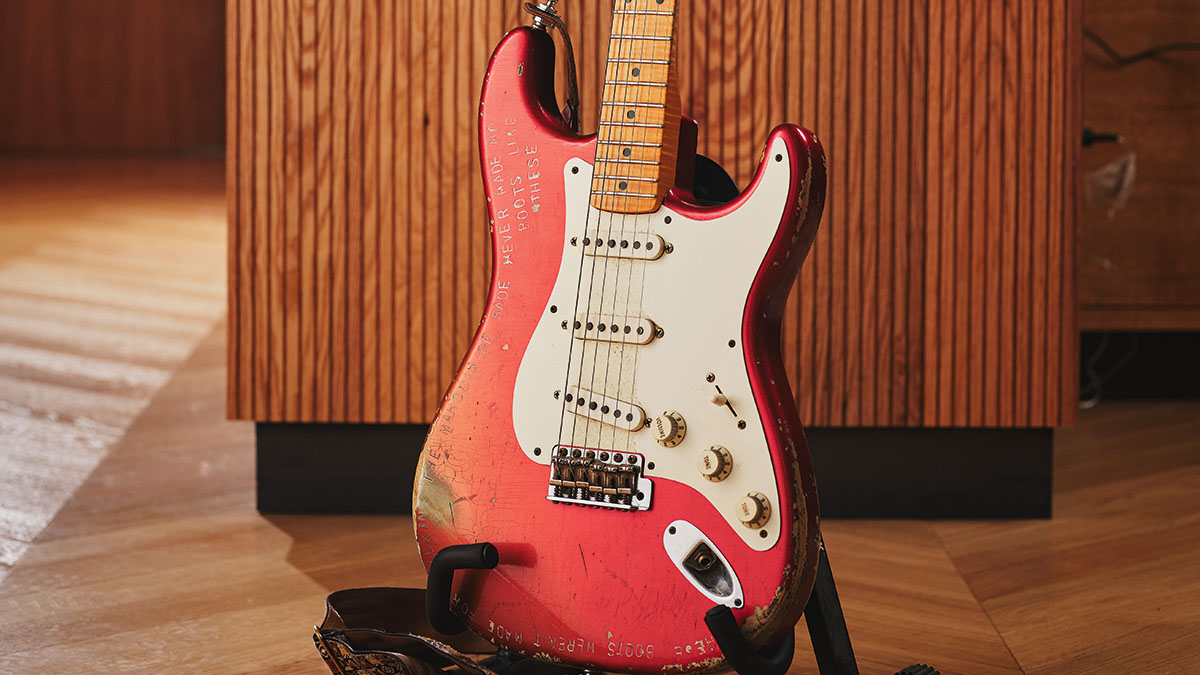
Do you remember your first guitar?
“It was a smaller-scale Strat copy my dad bought for my birthday. He was supportive but didn’t like the noise – he encouraged me to play on headphones. I quickly upgraded to a black Satellite Les Paul copy because that’s what Steve Jones played. I remember, I was riding to my friend’s house to rehearse, on my mum’s bike, with the guitar in a bin bag. Fell off in the rain and snapped the neck off it.”
There’s a certain romance in those experiences, though.
“It didn’t feel that way at the time!”
How did you start developing as a guitar player?
“The reason I started writing songs was because I struggled to play somebody else’s stuff. I was really into Hendrix, and my dad modified a record player so I could slow it down. It put me into depressive moods because I did it for so long that I felt like the whole world was slowing down. But it demystified it a bit. It was like, ‘Oh right, so it’s just that – but a lot better and faster than you’re doing it.’ That gave me hope it was attainable. I spent a lot of time on Red House.”
Did you aspire to be a guitar hero?
“I remember desiring that. Steve Jones had it written on his Fender Twin. And Joe Strummer says it in Complete Control, during Mick Jones’ solo: ‘You’re my guitar hero.’ But I don’t think of myself in that way.”
What are your favourite parts from the classic Roses albums?
“I particularly like the restraint towards the end of the [I Am The] Resurrection solo, with these single notes being played, just one note in a bar. Going Down has a micro-solo I really like. Waterfall, too. That came quite easy as well. They’re always good, those ones, rather than beating your head against a wall.
“My eldest son, Dillon, is a singer-songwriter and when he was young he said he’d learnt to play Waterfall. He was jumping all over the neck, not using a capo. I said, ‘This is how I do it.’ And he watched me play it, and said, ‘Yeah, I prefer it my way.’”
Second Coming is often held up as your most virtuoso playing – where are you now, relative to that?
“Probably more measured and respectful. I wish I hadn’t overdone the guitar on that second album. With this record, I’ve tried to keep out of the way of the vocal. This is a better guitar performance than the other records – and it should be, given the amount of years I’ve been playing.”
Do you recognise yourself as a young player on those Roses albums?
“That choppy thing I do [plays the Resurrection outro], I’m still doing that. I was in LA and this guy came running up and said, ‘I can’t believe you’re here! I modelled my whole guitar style after you! I bought a Gretsch Country Gentleman and I do that funky thing.’ I’m still using that trick and probably a lot of others.”
The story goes that producer John Leckie didn’t let you play that Gretsch on the first Roses album, so you used a pink ’60s Strat…
“I think the feedback at the start of I Wanna Be Adored was done with that Gretsch. I dunno… that guitar sounded good on the demos to me, but he hated it.”
Your ’59 Les Paul from Second Coming got sold – have you seen it since?
“It ended up back here recently. I was after buying a ’59 and that one came back. I don’t know a lot about them, but my guitar tech said there was a suspicion that the pickups had been swapped. It certainly didn’t sound as good to me as it did when I had it in the Roses.
“I chose a ’58 with a Bigsby over it. Those two Les Pauls turned up and we both agreed the ’58 sounded better – and it hadn’t been messed with. So that one is on You’re Not The Only One and I’m So Bored.”
We both love The Beatles, the Pistols. He’d send me things like Pretty Vacant and Bob Marley. I sent him a Humble Pie track
The Roses took off in 1989. Is that explosion of fame all it’s cracked up to be?
“Yeah, it’s great. Does it come at a price? Only insofar as it never sustains. But there is that glorious period when you can do no wrong and you’re surfing along, you’ve got loads of energy, you can stay up all night, you’re meeting loads of new people. You’re always travelling, getting new clothes, people giving you equipment.”
The Roses made rock ’n’ roll so visual, too. There were your iconic sleeves, the Jackson Pollocked guitars, the famous shoot where you were all covered in paint…
“Yeah. It turned out the red paint was corrosive and we ended up with welts all over us [smiles].”
In the Noughties, you sang on two solo albums. Do you prefer just handling guitar?
“Yeah, I hated singing. I just felt that after [post-Roses group] The Seahorses fizzled out, I might as well have a go. I look back at it with some sense of pride that I had the bottle to do that. It’s not really who I am. I don’t want to be the centre of attention. I got through it. Learned nothing from it.”
The Roses reunited in 2011 but split again six years later. How frustrating was it that a new album didn’t materialise?
“Well, no-one wanted to do it – so it turned out to not be that frustrating at all.”
Back to the new album: you mentioned you and Liam have common ground.
“We both love The Beatles, the Pistols. He’d send me things like Pretty Vacant and Bob Marley. I sent him a Humble Pie track. Hendrix was swapped. He sent me the Bee Gees – I remember thinking, ‘What the fuck?’”
How did the process work?
“I sang the songs – after a fashion – then tarted them up, buried them in reverb, did multiple takes and loads of editing to get them presentable, then sent them to Liam and he liked them. But it was a thousand-fold improvement when he got on them. I wasn’t prepared for the tone of the guitars to meld so well with his vocals.”
I’ve been chasing a riff that works around open G for years – since The Seahorses, actually – because there’s so many open strings you can mess around with
Do you usually nail your parts in one take?
“There were a couple where I did a lot of chipping away. Where I thought the track was gonna be in the toilet and we’d have to do it over the internet. One Day at a Time was a ‘bits and pieces’ song, but it came out really well. One of the last things I did was the solo on [first single] Just Another Rainbow.
“That was just one take and I really felt like I was in the moment there. I’ve been chasing a riff that works around open G for years – since The Seahorses, actually – because there’s so many open strings you can mess around with. I played slide in standard tuning on this album, too; I’ve never done that before.”
What was the most challenging part?
“You’re Not The Only One was pretty tricky. I spent a bit of time composing and practising it. I struggle with some of the simple guitar parts, too. I don’t know if it’s my age, but I find some of them hard to retain. I know what the solos sound like – but I don’t know what to do with my fingers.”
That’s the trouble with having such a big back catalogue…
“I’ve got a tiny catalogue!”
Don’t you feel like an ‘important British guitarist’?
“No. I don’t think I’m famous. I don’t think I’m a guitar hero. I feel like a dad.”
The track I’m A Wheel sounds like classic blues…
“It’s music that I love and it sounds great on the guitar, without a band, just on your own in a room. Blues just is what it is. It’s pure. I think of Hendrix as a bluesman – he just drove it really hard, slapped loads of effects on it. But it’s in there, innit?”
I’m driven by failure. When I listen to my stuff, I tend to focus on the imperfections. Even with an album like this, where it’s generally very satisfying, I’ll focus in on the things that aren’t quite right
Do you think guitarists improve with age?
“I think you can always improve. Until arthritis gets in the way. A big part of what I consider a plateau that I built on was breaking a bone in my hand a few years ago. I was playing basketball with my younger son, used my right hand to break my fall and broke the bone at the base of my thumb.
“The specialist didn’t know if I’d get full function back. So I had the cast on, my fingers were set about a centimetre apart and I got a plectrum and glued some thick rubber either side so I could hold it. I tried to play – and it was terrible. And I went spinning into thinking I might not ever play again.”
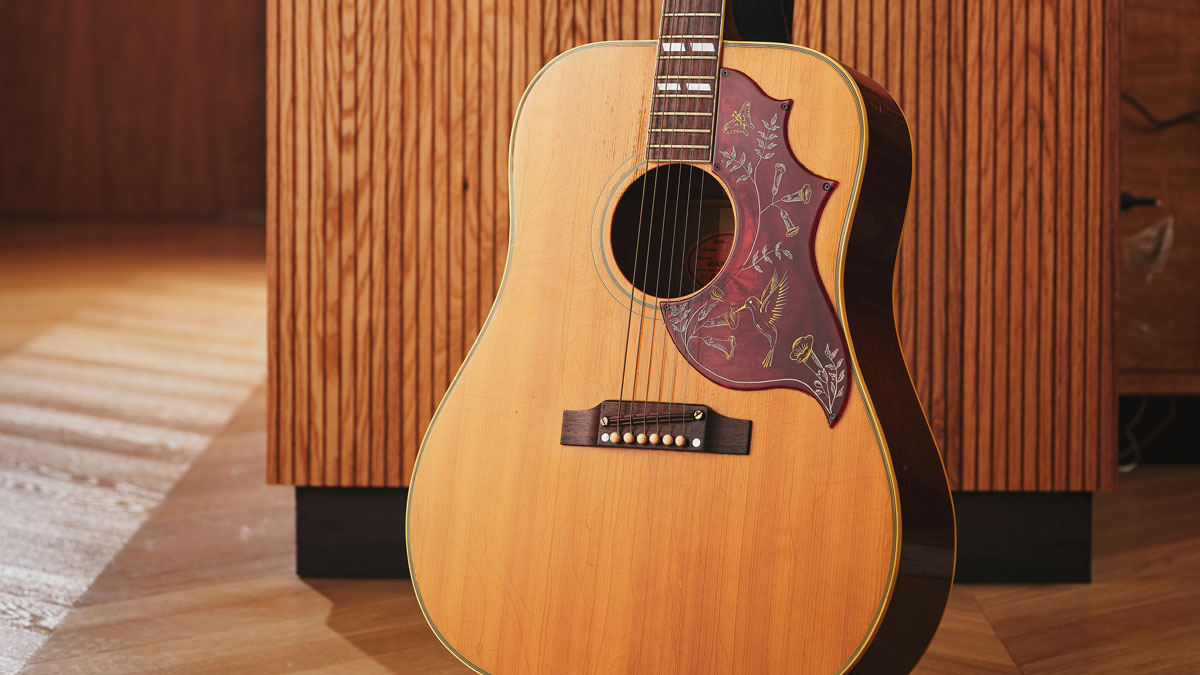
As a guitarist, how much of an existential crisis is that?
“Well, I also like to paint and spread margarine on toast. But it was sobering.”
Is there any area of your playing you’d still like to improve?
“All of them. I’m driven by failure. When I listen to my stuff, I tend to focus on the imperfections. Even with an album like this, where it’s generally very satisfying, I’ll focus in on the things that aren’t quite right. But I do that with painting as well. I do it if someone comes in and puts up new light switches.”
You once said you don’t know much about guitars. And now?
“I’ve picked up a little bit, but when I meet someone like Barrie Cadogan from Little Barrie – he used to work on Denmark Street and he always wants to geek out about guitars, but I can’t really help him.”

What guitars did you use on the Gallagher/Squire album?
“It was mostly this red 2012 Strat. It’s a Todd Krause Custom Shop and the inscription is from Fools Gold. I bought it during the Roses reunion and it was a hotel guitar because it always sounded a bit puny. But it was just in this room when I started writing the album. I knew I was going on holiday during the writing period, so I thought, ‘Why don’t I get a mobile system together?’
“To keep it simple, I didn’t use any [effects] boxes. I did it all with AmpliTube. And when I tried that Strat it just all fell into place. I had a ’57 Tobacco Burst Strat, too – and it was dogshit compared with that new one. It’s mainly the tone.
“On the rhythm pickup, it sounded mega. I always used to prefer darker woods, but it’s got a flame maple neck. That guitar is on every track. There’s a little bit in the Rainbow solo where I doubled that with a Firebird, just like a one-bar phrase that stands out.”
What can you tell us about the 1970 Hummingbird that we’re shooting today?
“That’s the acoustic on every track on this new album. I read on a Gibson forum about The Stones loving Hummingbirds – and I love the sound of Stones acoustics. I was intrigued by the name and they look cool. I did a bit of research, saw one online that looked to be in good shape and just tried it on spec, without physically playing it. I loved it immediately.
“Usually, when I play acoustic, because I’ve not got particularly strong hands, I struggle to sustain a note because you have to put so much pressure on. This one, I don’t know how they’ve done it, but it’s got a really slender neck, low action, really projects its sound. I don’t know if they’re all like that or I just got lucky.”
Jimmy Page once said to me, ‘Have Gibson not been onto you?’ And I said, ‘No, maybe I play too many Strats’
Are there any Roses guitars you regret letting go?
“My wife showed me a clip on Instagram from Denmark Street Guitars, saying the ’73 Telecaster Custom I used for Waterfall on the Roses reunion was available. I’d forgotten I’d got rid of it. I thought about buying it back.”
Why have you never designed a signature model?
“No-one’s asked me. Jimmy Page once said to me, ‘Have Gibson not been onto you?’ And I said, ‘No, maybe I play too many Strats.’ Jimmy said, ‘Yeah, probably.’ I think it’s more likely to be that they don’t know who I am.”
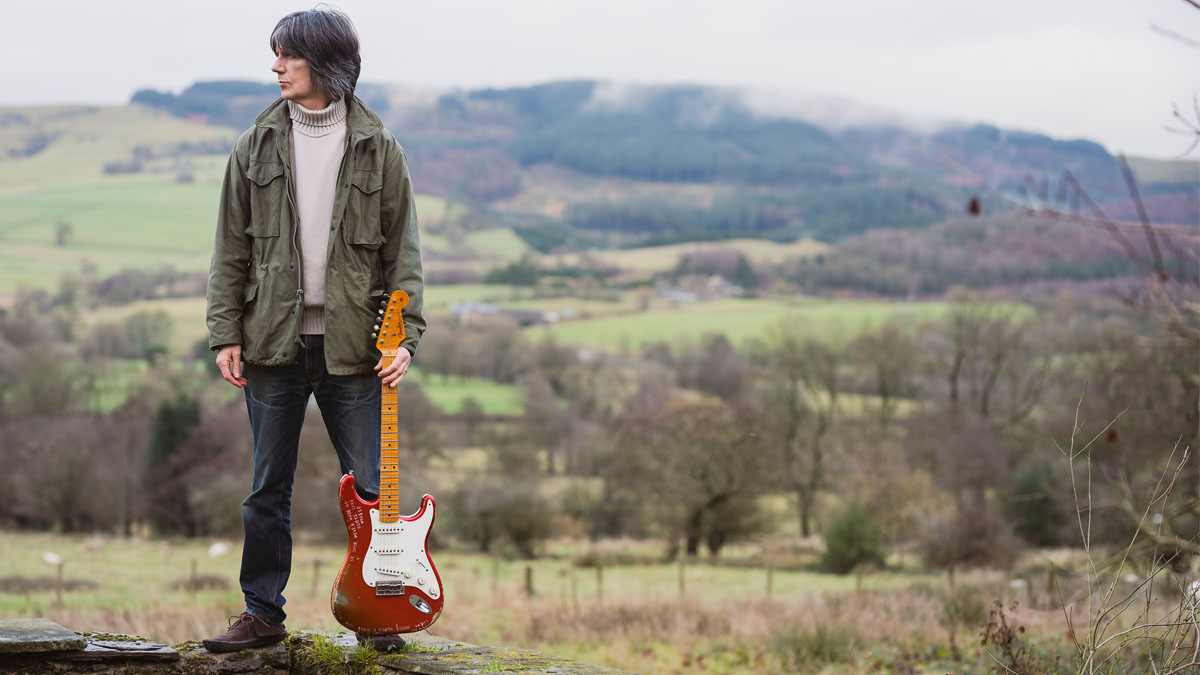
You used a Fender Twin with JBL speakers for the first Roses album. Did you have a traditional amp for the Gallagher/Squire sessions?
“Yeah. For the demos, we used plugins. For the sessions at Greg Kurstin’s studio in LA, we used physical amps. Greg had everything I had, so there was no need to ship anything out. I used his AC30 and modified Marshall JMP 50-watt Master Volume. In fact, we cloned them before we left.
“There were a few pedals knocking about – I forget what they were now [Squire anticipates his live rig will include the Electro-Harmonix Stereo Memory Man, Xotic RC Booster, Neo Instruments Ventilator II and a Vintage Pedal Workshop FET preamp made by Steve Giles].”
I will be using the Kemper Profiler with in-ears live... There will be real cabs on stage, though, because Liam likes to hear the guitar
Do you tend to keep up with guitar technology?
“No. I find all that stuff [frustrating]. I get stuff working and then five years later, everything is obsolete and it’s a major crisis. I will be using the Kemper Profiler with in-ears live. I was talked into that by my tech because of the advantage it gives the sound guy, getting a clean sound, because there’s no bleed. There will be real cabs on stage, though, because Liam likes to hear the guitar.”
Why do you think music keeps pulling you back in?
“Because it’s so powerful. In the studio, when we played back the finished mixes of Mother Nature’s Song, me and Liam both admitted to welling up. So music can affect you that way. It can be uplifting. It can make the hairs on the back of your neck stand up. I don’t know another art form that can take you there.”
- Squire/Gallagher is out now via Warner Records.
Henry Yates is a freelance journalist who has written about music for titles including The Guardian, Telegraph, NME, Classic Rock, Guitarist, Total Guitar and Metal Hammer. He is the author of Walter Trout's official biography, Rescued From Reality, a talking head on Times Radio and an interviewer who has spoken to Brian May, Jimmy Page, Ozzy Osbourne, Ronnie Wood, Dave Grohl and many more. As a guitarist with three decades' experience, he mostly plays a Fender Telecaster and Gibson Les Paul.

